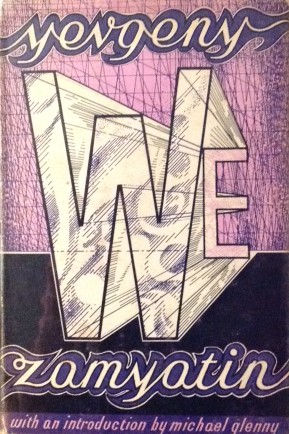Inspiring Older Readers
 posted on 03 Sep 2016
posted on 03 Sep 2016
We by Yevgeny Zamyatin
For fans of dystopian literature, Yevgeny Zamyatin’s We has a legendary status – although I suspect that many more people may have heard of it than have actually read it. A good deal of its fame in the West revolves around the influence the book is assumed to have had on both Aldous Huxley’s Brave New World and George Orwell’s 1984. It is certainly the case that Orwell got hold of a copy and reviewed the book in 1946 – three years before the publication of 1984 – but Huxley explicitly rejected the idea that he had been influenced by Zamyatin, saying that his book was actually a response to the writing of H.G.Wells. Either way, We stands as an early example of a novel concerned with a political dystopian future and contains within it the essential tropes that would come to characterise that genre.
It has also been assumed that Zamyatin’s future world was a satire of the emerging USSR although this has to be taken with a degree of scepticism. Zamyatin was born in 1884 and in his youth he was committed to the Bolshevik cause – he was, in fact, sent to Britain in 1916 to oversee the manufacture of ice-breaker ships in Newcastle and became a noted Anglophile. He only began losing his faith in the revolutionary cause after 1917 when he came to fear the way in which the CPSU was making an increasing use of censorship to control opinion. However, by the time We was ready for publication in 1923 Stalin had not yet taken full control of the government and so we can assume that Zamyatin’s satire was aimed at the more general drift towards totalitarianism that was evident in Europe rather than a specific critique of the Soviet Union. He did, however, rightly assume that his book would be banned and so he arranged to smuggle copies of the manuscript out of the country and to a US publisher, E.P. Dutton & Co. As a result of this he was finally officially blacklisted.
There is plenty in the plot of We that will now seem very familiar to readers – the overbearing, intrusive State; the erasing of personality in favour of uniformity; the use of numbers rather than names; and, the seemingly inevitable dissident who rebels against the regime and has to be brought back into the fold. Zamyatin’s population lives in the One State, a time when logic and order are deemed the most desirable characteristics and they live in a world of constant observation – these people literally live in glass houses and can be constantly watched by euphemistic Guardians. They are, however, able to draw blinds at stated and agreed times in order to conduct their rather impersonal sex lives. The central character of the book, D-503, is a seemingly model citizen when we meet him – he is most happy with science and maths rather than relationships and emotions and he is a key worker on the project known as the Integral – a spaceship that will take the One State and its values out into the universe.
His life is cast into a confusion of conflicting emotions when a woman known as I-330 comes into his life and introduces him to drink, cigarettes and counter-revolutionary ideas. He knows he should stick with the safety of his predictable life and relationship with dull but loyal 0-90 but he has been seduced by the notion of non-conformity and effectively becomes incapable of thinking of anyone else – is this love or infatuation? I-330 is in fact part of an anti-State underground known as the Mephi and, if you know your dystopian fictional tropes you will also have guessed that D-503 is doomed to betray them. To find out how this happens, I’ll leave you to read the book yourself.
Despite its classic status, this book isn’t an easy read. It has plenty of stylistic peculiarities that I found made the text quite hard to relax with – I must have read a couple of sections two or three times to be sure I was following the plot (although I’m also not sure how much of this is down to the author and how much to the translation). Orwell himself wasn’t entirely convinced by the book – he had had to wait quite a long time to get hold of a copy and his review is, at best, ambivalent. However, for me, there can’t be any doubt that We was an important influence on later science fiction novelists but not because he introduced anything genuinely original or unique but because he must have been one of the first to pull together the component parts of what we now see as the classic dystopia from a range of different sources – including, and possibly most importantly, the early works of Wells and Verne.
The copy I read was the UK first edition published by Cape in 1970 with a translation by Bernard Guilbert Guerney Other editions of We can be easily obtained in paperback and now also with a range of different translators..
Terry Potter
September 2016